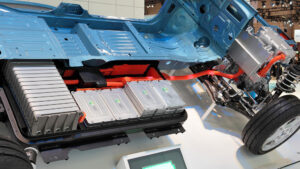Physical Address
23,24,25 & 26, 2nd Floor, Software Technology Park India, Opp: Garware Stadium,MIDC, Chikalthana, Aurangabad, Maharashtra – 431001 India
Physical Address
23,24,25 & 26, 2nd Floor, Software Technology Park India, Opp: Garware Stadium,MIDC, Chikalthana, Aurangabad, Maharashtra – 431001 India

CLAIM
There is nothing environmentally friendly about EVs as the cobalt needed for EV batteries is obtained through mining that harms the environment.
FACT
Misleading. Cobalt is not indispensable for EV batteries and cobalt-free alternatives are emerging fast. Also, EVs easily outweigh normal vehicles in terms of overall environmental friendliness.
WHAT THEY SAY
They claim that electric vehicles are not environment or climate-friendly as the batteries used to run them promote activities like mining. They further claim that components of EV batteries like cobalt are not environment-friendly and are sourced using illegal activities like child labor. The fact that in many cases EV batteries are being charged using power drawn from fossil fuel-powered stations is being used to further claim that electric vehicles are not a viable and better alternative to combustion engine vehicles.
Here is one such Twitter Post:
WHAT WE FOUND
As EVs are increasingly gaining popularity, misinformation about EVs too are growing by leaps and bounds, especially on social media. The use of cobalt in EV batteries is a topic that is getting wide attention and of much debate at present.
Not Indispensable
We found that while it is true that cobalt is found as a component in the lithium-ion batteries used in many EV batteries, it is not indispensable. EV manufacturers are transitioning away from cobalt as it is being increasingly phased out in favor of better alternatives. Other battery technologies that don’t use cobalt are emerging. Nickel-iron-aluminum cathodes or lithium-iron-phosphate batteries are being actively developed for use in new EVs. So, it will be misleading to claim that EVs cannot be environmentally friendly because they use cobalt in their batteries.
Tesla’s current EV batteries contain less than 5% cobalt and as per a company announcement in September 2020, they are developing their own cobalt-free batteries. Others like General Motors (GM) too are significantly reducing the amount of cobalt in their batteries. GM recently unveiled a new battery system that uses 70% less cobalt than current batteries.
Wrong to target EVs for Cobalt
While cobalt is getting all the attention for EVs, almost to the point that a narrative has emerged as if EVs are the first to use cobalt. The fact of the matter is that cobalt has a long industrial history with a variety of uses. The largest of cobalt use is in portable consumer electronics like cell phones, laptop computers, and tablets, which are all powered by lithium-ion batteries. It is a metal found in many products ranging from aircraft engines to lithium-ion batteries to EV batteries.
Cobalt is mined, primarily in Australia and the Democratic Republic of the Congo and it is well-documented that cobalt mining often involves unethical labor practices in places like Congo. But to target just the EVs in terms of Cobalt is meaningless in this modern world.
Cobalt-free batteries mean cheaper EVs
One of the main reasons why EVs are not being adopted by consumers across the world at a much faster pace is because of the high price. The main reason for the high price of EVs is because of the costly batteries. The present lithium-ion batteries mostly used in EVs contain various materials including lithium, nickel, aluminum, iron, manganese and cobalt. Of all these, cobalt is the most expensive and is actually preventing mass electrification. Thus transitioning to cobalt-free batteries is highly cost-effective in terms of EVs.
LFP Batteries
LFP batteries stand for lithium-ion phosphate batteries and they are being used as a viable alternative to cobalt batteries. Low energy density and therefore less driving range is one downside of LFP batteries but they are much cheaper and last longer in comparison to lithium-ion batteries using cobalt. At present, some automakers, including Tesla and Ford, are transitioning to lithium iron phosphate batteries in at least some vehicles. While Tesla is planning to introduce LFP batteries in shorter ranges and lower-priced EVs, Ford is going to introduce them in some trucks customized for fleet owners.
Overall Environmental Friendliness
EVs are generally more emission efficient than conventional vehicles (CVs) that are driven by internal combustion engines that use fossil fuels like petrol, diesel or natural gas. Studies done in Europe and America indicate that EVs emit 40% less GHG compared to petrol or diesel-based vehicles even when you account for GHG emissions during the battery production process. Life cycle assessment of GHG footprint of EVs versus CVs that take into account emission during all processes and phases of manufacturing, maintenance, use and efficiency, has indicated that even at present EVs are relatively cleaners than CVs.
We have done fact-checks and explainers earlier that clearly show that EVs easily outweigh normal vehicles in terms of overall climate and environmental friendliness.